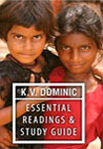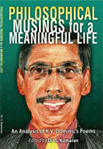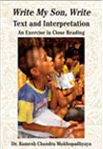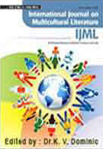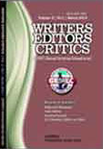Books Review in Detail
Review Of Patricia Prime’s Review of K. V. Dominic’s Write Son, Write
Patricia Prime’s Review Of Write Son, Write
K. V. Dominic’s Write Son, Write. New Delhi: GNOSIS, 2011.
99 pp. Paperback. Rs. Â 125. ISBN: 978-81030-25-7.
Â
Patricia Prime
Â
Write Son, Write is K. V. Dominic’s second volume of poetry, although his writing and criticism have been widely published. The collection not only includes a Preface by the author, a Foreword by P. C. K. Prem, but also delightful little pen drawings throughout its pages. The book is dedicated to the poet’s mother and includes the fine poem “An Elegy on My Ma.†Here is the concluding passage:
What would be our fate, Ma,
when we become old as you?
Who will care for us
as we cared for you
one after other?
“It’s better not to
fret on morrow;
Surrender unto Him
who created you.â€
Ma, we will go ahead
boosted by your divine words.
This selection contains all the wryness, humour and adept observation of Dominic’s first collection Winged Reason. The themes of family, love and loss are other constants. This latest release builds upon a territory its author has already charted strongly, and in that makes for a book which is a perfect “companion read†to its predecessor and a commendable offering in its own right.
My son,
I have a mission
in your creation,
God spoke
to my ears.
Why do you
look up?
Look at the tip
of your pen.
I am the ball
of your pen;
I am the ink
that flows
on the paper.
Write, my son, write.
Write till
I say stop.
begins the titular and the collection’s longest poem. Here one heeds the message, important and skillfully-put as it is.
Amazement is a good watchword for this collection. Sometimes, the amazement is the author’s particularly through poems about his country, animals and the poem “Aung San Suu Kyi–Asia’s Lady Mandela.â€Â Often though, the amazement is the reader’s–the kind of gentle amazement unearthed when we alight upon a startling, but resonant image Dominic offers us. The poem, “Coconut Palm,†for instance, offers us an unexpected view of a palm tree:
Standing erect on lean tall foot
and growing up to hundred feet
bearing tons of leaves and fruits.
A marvel to all architects.
No human hand can build
such a parallel pillar
Kudos to the Architect of architects!
Animals are perfect magnifiers of human behaviour, its successes and failings. Dominic offers several poems which prove the veracity of this rationale. Cats, cows and crows are just a few of the animalia Dominic’s verse embraces. With something of a “tongue-in-cheek†humour, the poem “Crow, the Black Beauty†gently leads us into the world of the crow:
Crow, the commonest bird in the world;
cleaner of kitchen garbage;
has seldom been sung
in praise by the poets.
This solidity of meaning in these poems and their simple poetic style (short lines, imagery and atmosphere) continually underpins the poems, but is especially apparent in “Flowers’ Greetings,†“Hungers’ Call†and “Nature Weeps.â€Â Here and elsewhere are poems which, like the land and society in which the author lives, strive to embrace and confirm his personal beliefs and his ideological commitment. Take a poem like “For the Glory of God,†for instance, which begins:
Chellamma Antharjanan, aged seventy-five;
widow, childless, weak and homeless.
Rejected by relatives, neighbours and society,
decides to end her life on a railway track.
Counting down minutes, she timorously waits;
the alien Death will arrive in train
and take her to a happy abode.
This juxtaposition is typical of the way contradiction is used by Dominic throughout the collection to evoke the pains and pleasures of life along with the epic and everyday. As an example, we may look at the poem “Rocketing Growth of India!†which keeps the reader suspended between the plight of the poor and the growth of the rich:
Rocketing growth of India!
Overtaking America,
surpassing Europe,
competing with China.
The tornado of recession,
evolved in America
swept over Europe,
dashed towards Indian continent,
but drowned in the Indian Ocean.
The collection ends with a homage to a Wordsworth poem: “Lines Composed from Thodupuzha River’s Bridgeâ€:
Looking down from you girdle bridge
my eyes and mind bathe in they morning beauty.
Invigorating cool water gushing through your vein
overflows my mind with eternal realities.
Every second passed in our lives
is irredeemably lost forever.
This poem, for me, sums up Dominic’s belief in the harmony and beauty of life. The seconds passing by add up to a lifetime, which we must use for the good, not only of our friends and families, but for mankind and for ourselves. The poet’s faith in God and belief in the afterlife, allows him to observe creation, with all its foibles and beauty. He finds God in everything that surrounds him: the poor, the suffering, the rich, the hungry, and the good. This enables him to write his poems to bring harmony to our spiritual and physical selves. These poems, which are both inspired and well-written, work at several levels, one of which is biographical to the poet, another that encompasses the wider world.  That said there is plenty of space for the reader not only to delight in the language, tensions, and the rhythms, but also to make their own, quite different readings.

